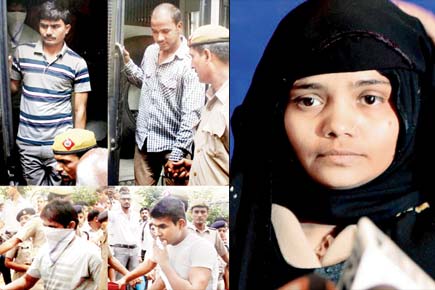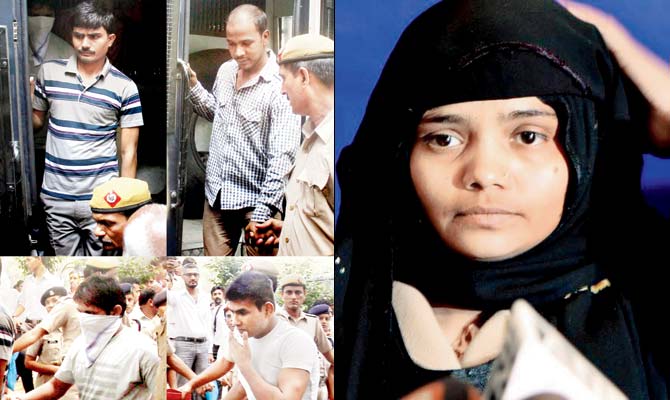Indians are turning into a bloodthirsty lot, by calling for revenge-killings, supporting death penalties and wanting to tighten screws on Kashmir


The middle-class were whooping the death penalty for Jyoti Singh's rapists (left) but it is ironic, how a high court upholding the sentence in the gang rape of Bilkis Bano during the Gujarat riots, did not arouse the same reaction. File pics
 I returned to India last week from the US. It was an emotionally-draining visit: watching a friend die in semi-rural New England; catching up with my daughters in paradisiacal California; and spending time with my elderly parents in hyper-hipster Brooklyn, New York. America is fascinating, but her people are a bit cold. I looked forward to India, my homeland and home for the past 30 years. In the week gone by, however, I increasingly found Indians to be a bloodthirsty lot.
I returned to India last week from the US. It was an emotionally-draining visit: watching a friend die in semi-rural New England; catching up with my daughters in paradisiacal California; and spending time with my elderly parents in hyper-hipster Brooklyn, New York. America is fascinating, but her people are a bit cold. I looked forward to India, my homeland and home for the past 30 years. In the week gone by, however, I increasingly found Indians to be a bloodthirsty lot.
The first sign was the headline the morning I arrived, screaming of two uniformed personnel having been beheaded by Pakistani special forces. It was shocking, uncivilised and outrageous.
TV anchors shrieked louder than wild baboons for another surgical strike on Pakistan. Some news channels claimed retaliation had already been visited across the Line of Control (LoC). On social media, middle-class cheerleaders called on the Great Leader to rid India of this "cancer" once and for all.
Surreally, no one called for urgent talks, which is how nations normally solve bilateral problems. Yes, India and Pakistan haven't been talking – and now look at what it's led to. The beheading isn't a "point of no return", however: one, India has also beheaded enemy soldiers in the past; and two, deaths in LoC skirmishes have anyway increased since bilateral relations took a nosedive. Whether a soldier is shot or beheaded, India has lost a son and a family has lost a father/husband.
Then there's the story behind the story: on April 17, 10 or more Pakistani soldiers died in a skirmish with India in the same sector. The beheading was either payback or Pakistan expects another surgical strike and is prepared for it. Either way, it wasn't out of the blue. The two national security advisors are hopefully looking to de-escalate tensions.
Further bloodlust was evident on Friday, when the Supreme Court confirmed the death penalty on the rapists and murderers of Jyoti Singh. One cannot argue with the decision, since the death penalty is part of our law. Make no mistake, however, a state-sponsored hanging is as barbaric as a state-sponsored beheading.
When a lower court originally passed this sentence, I wrote against hanging the criminals. Many friends attacked me; one accused me of wanting to feed the murderers/rapists biryani. (The biryani taunt was earlier reserved for terrorist sympathisers.)
Once again, friends and relatives gurgled with delight, saying that the Supreme Court order would be a deterrent against rape. How absurd. First, the hanging is for the murder, not the rape. Second, the death penalty has never proven to be a deterrent to any crime. Third, the death penalty is morally wrong because it allows the State to commit murder. Fourth, giving the State the power to murder enables the State to misuse that power. Fifth, the death penalty does nothing to heal the victim or her family; it is simply to satisfy the Indian mob (or as the courts like to call it, the "collective conscience of the nation").
Sixth, the death penalty in India has proven to be a political tool, no matter which cynic is in power – note the 2013 hanging of convicted Parliament attack conspirator Afzal Guru.
Yet, the educated, well earning middle-class were whooping it up as if they had gathered in the village square in 17th century England to watch a witch burning. It was disturbing. Also, it was ironic that a day earlier, a high court upholding of the sentence in a 2002 Gujarat riots case – the gang rape of then-pregnant Bilkis Bano and murder of 14 of her family members – did not arouse the same middle-class reaction.
Then there's Kashmir. After last year's summer, when about 100 people died and nearly a thousand were shot in the eyes, the mood in India is to keep Kashmiris in their open-air prison, and further tighten the screws. Experienced men like former Research and Analysis Wing chief AS Dulat have urged Prime Minister Narendra Modi's government to talk to various sections of society, but the response was: you had your chance, you didn't sort the problem out, now it's our turn. Except, this deliberate, cold response is akin to beheading and hanging the Kashmiri youth.
Part of the middle-class bloodlust is a blind acceptance to the government handling things as it sees fit. Don't question the government is a common refrain on social media; it knows what it's doing. There is little evidence supporting this assertion. Since Modi came to power, there has been a dramatic upsurge in killings with a societal dimension around India.
No wonder then, that more than half the speakers at the United Nations Human Rights Commission last week told India to check violence on women and minorities, the love jihads and cow vigilantism. The middle-class Indian may feel that he has arrived, but alongside him so has the Ugly Indian.
Aditya Sinha's crime novel, The CEO Who Lost His Head, is available now. He tweets @autumnshade. Send your feedback to mailbag@mid-day.com
 Subscribe today by clicking the link and stay updated with the latest news!" Click here!
Subscribe today by clicking the link and stay updated with the latest news!" Click here!









